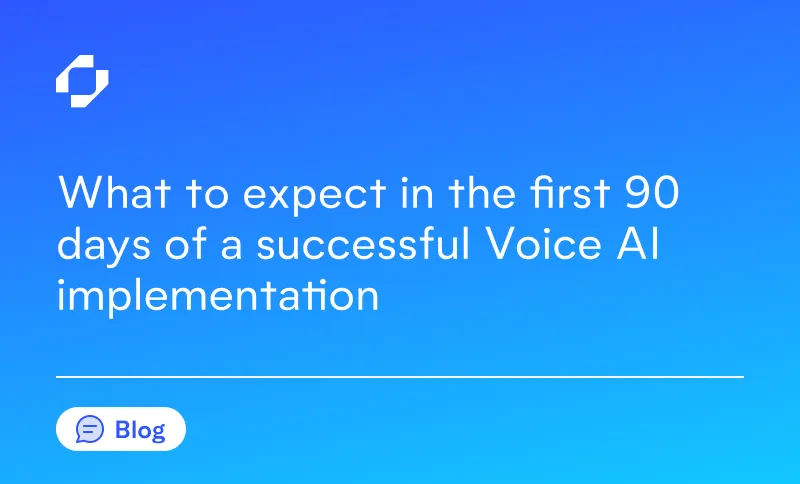Quick Summary
Searching for Sierra alternatives? This article covers 10 conversational AI platforms that specialize in voice automation, LLM-powered agents, and contact center transformation. You’ll learn the key features, pricing, pro’s and con’s for Sierra and alternatives including Replicant, Kore.ai, Cognigy, PolyAI, Google Dialogflow, Amazon Lex, Amelia, Observe.ai, Decagon, and NiCE CXOne.
We’ll also take a closer look at how Replicant compares, and why it’s a strong option for teams ready to deploy voice AI in weeks, not quarters.
Looking for the Best Sierra Alternatives?
Sierra has gained attention for its hybrid AI approach, combining generative language models with traditional logic-based flows. While this dual model can offer balance, it also introduces complexity that doesn’t suit every organization.
Here are a few reasons companies start exploring alternatives:
- Uncertainty around generative AI behavior in production
- Limited voice-specific tooling and experience
- A desire for faster time-to-value and prebuilt use cases
- More structured support and delivery teams
- Better integration with existing contact center stacks
If your team is evaluating new platforms for voice, messaging, or multimodal AI, the following 10 Sierra alternatives offer diverse approaches from fully managed deployments to deep LLM customization.
Why Trust Our Recommendations?
At Replicant, we’ve partnered with some of the world’s most complex contact centers to automate millions of customer conversations. Our solutions are deployed across retail, insurance, healthcare, travel, and financial services, each with its own compliance and operational demands.
Because we’ve worked alongside enterprise operations teams for years, we understand what it really takes to make conversational AI succeed: fast implementation, measurable ROI, scalable voice, and a clear roadmap for AI maturity.
What Is Sierra?
Sierra is a relatively new player in the voice AI space, focusing on large language model (LLM) integrations paired with guardrails that add business logic and control. Their platform is designed to allow customer service agents to operate independently using a blend of generative AI and scripted flows.
Core features include:
- LLM-powered agent assistants
- Guardrails and fallback logic
- Modular conversation design tools
- Custom flow building
- Reporting and analytics
Sierra’s emphasis on agent autonomy and LLM creativity is appealing to innovation-focused teams, but some organizations may need more structure, control, or support for enterprise rollout.
Limitations of Sierra
Sierra is a forward-thinking platform, but there are several common challenges that can limit its fit:
- Emerging maturity: As a newer company, Sierra is still building out enterprise-specific functionality.
- Voice experience gaps: The platform isn’t natively voice-first and may require external tools for high-quality speech flows.
- Tuning and hallucination risks: LLM-powered systems can require ongoing training and supervision.
- Lack of prebuilt flows: Most use cases must be designed from scratch.
- Support model: May not offer the same level of white-glove delivery as enterprise-focused vendors.
If you're looking for a platform that's voice-native, enterprise-tested, and capable of fast deployment with minimal complexity, the following alternatives are worth your attention.
Top 10 Sierra Alternatives
Read on to learn more about the following 10 top Sierra alternatives:
- Replicant
- Kore.ai
- Cognigy
- PolyAI
- Google Dialogflow
- Amazon Lex
- Amelia
- Observe.ai
- Decagon
- NiCE CXOne
1. Replicant
Replicant provides a comprehensive Conversational AI platform built specifically for contact center complexity and scale. While Sierra AI offers an intuitive interface, Replicant delivers significantly more advanced capabilities through its dual-product approach: Conversation Automation manages complete customer interactions without human intervention, while Conversation Intelligence analyzes every conversation with multi-modal large language models to extract actionable insights.
Beyond Sierra's basic multi-channel support, Replicant handles sophisticated multi-turn conversations across voice, chat, and SMS with hyper-realistic voice technology that creates remarkably human-like interactions. This powerful combination enables contact centers to fully resolve customer inquiries end-to-end rather than simply routing them, while simultaneously gathering intelligence that improves both AI and human agent performance. Replicant offers a mature, enterprise-grade solution built to address the nuanced demands of modern contact centers at scale.
Key Features
- Voice-first architecture: Designed to automate entire call flows, not just routing or FAQs.
- Multichannel support: Automates conversations across phone, messaging, and digital channels.
- Real-time backend Integrations: Syncs instantly with CRMs, ERPs, and support platforms.
- No-code management tools: Business users can edit flows without developers.
- Built-in insights: Conversation Intelligence uncovers agent coaching opportunities and automation potential.
Pricing
Custom pricing based on call volume and complexity. Flat-rate pricing available for predictability.
Pros
- Voice-native with deep telephony experience
- Fast go-lives (30-60 days on average)
- Proven at scale in enterprise environments
- Fully managed implementation and optimization
Cons
- Best suited for enterprise and upper mid-market teams
👉 Learn more about Replicant’s Conversation Automation
👉 Request a demo
2. Kore.ai
Kore.ai offers a comprehensive bot development platform with natural language understanding, analytics, and deployment across voice and digital channels. It’s a flexible option for technical teams looking for custom bot architecture.
Key Features
- Multi-bot orchestration
- Visual flow builder and testing tools
- Omnichannel deployment
- Pre-built vertical templates
- Enterprise-grade analytics and monitoring
Pricing
Custom quote based on usage volume, features, and channels.
Pros
- Highly customizable
- Wide range of use cases across industries
- Strong analytics dashboard
Cons
- Requires more engineering lift than SaaS-native tools
- Voice optimization requires extra tuning
- Time to value may be longer than other platforms
3. Cognigy
Cognigy is a popular choice for global enterprises that need localization, compliance, and contact center-grade capabilities. It offers a low-code platform with both voice and messaging channels.
Key Features
- Drag-and-drop flow editor
- Multi-language and localization tools
- Telephony integration and voice gateway
- Enterprise SSO and security
- Custom integrations with CRMs and service tools
Pricing
Enterprise license model with custom pricing tiers.
Pros
- Ideal for multinational deployments
- Flexible and extensible for developers
- Strong track record in finance, aviation, and healthcare
Cons
- Voice UI is less intuitive than newer platforms
- May require partner services for implementation
- User training needed for advanced features
4. PolyAI
PolyAI builds voice assistants that sound highly human and handle customer conversations across industries like hospitality, financial services, and insurance. Its focus is on reducing friction in customer interactions via natural language understanding.
Key Features
- Neural speech synthesis
- Pre-built flows for specific industries
- Language support for global rollouts
- Context-aware memory handling
- Always-on availability
Pricing
Custom pricing based on number of use cases, call volume, and language support.
Pros
- Best-in-class for natural-sounding voice
- Quick to deploy with pre-trained flows
- Works well with high call volume use cases
Cons
- Limited flexibility for custom logic
- Not ideal for heavily regulated workflows
- Integration layers may require engineering support
5. Google Dialogflow
Dialogflow CX is Google Cloud’s conversational AI product, enabling developers to build sophisticated bots with contextual flows and logic. While strong on NLP, Dialogflow often needs additional tooling to support enterprise voice deployments.
Key Features
- Contextual flow builder
- Natural language processing with BERT models
- Pre-built agents and templates
- Multilingual support
- Integration with Contact Center AI
Pricing
Google Dialogflow has one main conversational AI product with pay-per-use pricing. New customers receive $1,000 in trial credits for CX with Generative AI features and $600 for standard CX features, valid for 12 months.
Pros
- Excellent NLU performance
- Deep integration with Google Cloud
- Highly customizable
Cons
- Developer-heavy setup and management
- Voice performance requires third-party services
- Self-service support model
6. Amazon Lex
Amazon Lex is the conversational AI engine behind Alexa, designed for developers who want to build custom bots using AWS infrastructure. It’s a good choice for companies already committed to the AWS ecosystem.
Key Features
- Real-time speech recognition and intent parsing
- Native AWS service integrations (Lambda, S3, etc.)
- SDKs for multiple programming languages
- Dynamic response generation
Pricing
Pay-as-you-go pricing based on usage volume.
Pros
- Ideal for tech teams with AWS experience
- Well-documented APIs and developer tools
- Serverless deployment options
Cons
- Steep learning curve
- Requires cloud infrastructure setup
- Not voice-first in design
7. Amelia
Amelia (from SoundHound AI) blends conversational AI with backend process automation (RPA) to create intelligent agents capable of handling both inquiries and actions. It’s often used in banking, insurance, and telco environments.
Key Features
- Integrated voice and chat agents
- Emotional intelligence and sentiment analysis
- RPA workflows and legacy system integration
- Predictive modeling for next-best action
Pricing
Enterprise contracts with multi-year agreements.
Pros
- Combines voice and RPA automation
- Proven in regulated industries
- Supports complex customer journeys
Cons
- Lengthy deployment cycles
- Requires technical and change management teams
- High initial investment
8. Observe.AI
Observe.ai is a conversation intelligence platform that helps contact centers analyze calls, coach agents, and identify areas for automation. It doesn’t offer full voice automation but integrates with systems that do.
Key Features
- AI-driven QA and compliance monitoring
- Agent assist and real-time prompts
- Conversation insights for CX and operations
- Integrates with leading telephony platforms
Pricing
License-based pricing with usage tiers.
Pros
- Improves agent performance and training
- Rich insights into call quality and outcomes
- Easy to integrate with CCaaS platforms
Cons
- Not a standalone conversational AI platform
- Doesn’t support self-service automation
- Works best alongside voice AI tools like Replicant
9. Decagon
Decagon builds AI agents powered by large language models, focused on supporting use cases across support and sales. It’s known for speed and flexibility but is still developing its voice offering.
Key Features
- Generative LLM-based agents
- Rapid agent creation and testing
- Multichannel support (email, chat, messaging)
- Integration-ready APIs
Pricing
Custom quotes based on scope and usage.
Pros
- Fast development cycles
- Built with generative AI from the ground up
- Friendly UI for iterating flows
Cons
- Voice capabilities still evolving
- Generative responses may need oversight
- Less proven in enterprise-scale voice automation
10. NICE CXone SmartAssist
SmartAssist by NICE is a virtual agent solution that’s part of the broader CXone suite. It focuses on optimizing customer journeys through smart automation and AI-enhanced routing.
Key Features
- Enlighten AI intent modeling
- Seamless bot-to-agent handoff
- Voice and digital automation flows
- Built-in analytics and QM
Pricing
NICE CXone offers bundles with per-agent monthly pricing for plans with conversational AI capabilities. It also offers additional conversational AI features available as add-ons:
- AI-powered Self-Service
- Agent Augmentation
- Knowledge Management
- Experience Optimization
All pricing is per-agent per-month with custom quotes available for enterprise deployments.
Pros
- Robust for teams already using NICE CXone
- Strong compliance and monitoring tools
- Designed for enterprise contact centers
Cons
- Not suitable for standalone bot deployments
- Requires CXone ecosystem to unlock full value
- Voice quality depends on configuration effort
Choose the Best Sierra Alternative: Replicant
Sierra’s LLM-powered agents may suit teams that want to experiment with generative AI for service interactions. But for organizations prioritizing stable, scalable automation across phone calls, Replicant offers a more proven approach.
Replicant delivers real business results: faster response times, higher containment, and improved CSAT, all through natural-sounding conversations that customers trust. With white-glove onboarding, a purpose-built voice platform, and enterprise-grade scalability, Replicant helps teams achieve results without the guesswork of managing generative AI in production.
Request a demo to learn how Replicant can help your contact center automate Tier-1 conversations at scale.






